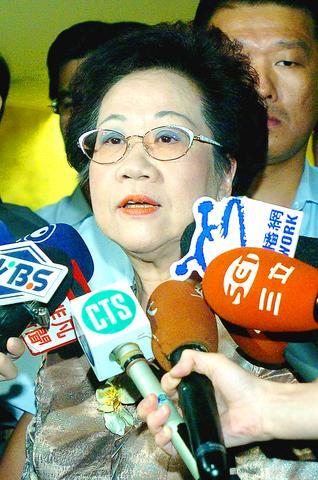Pop star Chang Hui-mei (
The Taiwanese pop diva, better known as A-mei, again found herself at the center of political controversy yesterday. But unlike last time, when China enforced a media blackout and she received threats from Chinese ultra-nationalists, A-mei is now under fire from those who champion Taiwanese pride.

PHOTO: LIAO CHENG-HUEI, TAIPEI TIMES
The Puyuma Aboriginal singer said she was shocked that some TV talk show hosts urged a boycott of her upon her return from her concert in Beijing last Saturday. Wang Ben-hu (
A-mei was quoted in by CCTV as saying "I had to suffer the consequences of a decision that was not made by me ... I should have been more discreet in my behavior, which impacts so many people."
Vice President Annette Lu (
"How could anyone not have any political consciousness?" Lu said. "If A-mei's being oppressed by China resulted from her performance of the national anthem, A-mei should say out loud [to China]: `It is my right to sing the Republic of China's national anthem. You Chinese people can sing your national anthem, why can't I sing mine?'"
Lu added, "I can understand why A-mei didn't say it, because she is still young. But if the two governments were at war, would it be more important for A-mei to sing in Beijing or to defend the 23 million people [of Taiwan]?"
The vice president and others' comments prompted the 31-year-old singer to make a brief response yesterday afternoon at a press conference.
"I am just a singer," the diva said. "I am not capable of dealing with politics. Many things are out of my control ... The world of grown-ups should be left to grown-ups. We all know that singers should not be involved in politics."
The singer made it clear that she has no intention of engaging in anything irrelevant to her profession. A-mei also called on the media to cease its sensational reporting and stop distorting her words. "What we really need is more peace and love in our society," said the singer.
As for her questioned patriotism, A-mei said she will be a representative for the Tourism Bureau and that her goal is to introduce the country's beauty and the goodwill of its people to a wider international audience.
Meanwhile, Premier Yu Shyi-kun yesterday offered a clarification of his own previous remarks about the singer. Local media had reported Yu as making critical remarks about A-mei. But yesterday, he explained that his remarks were intended to criticize China, and that he had not intended to criticize the singer herself. He said local media had misquoted him.

NATIONAL SECURITY THREAT: An official said that Guan Guan’s comments had gone beyond the threshold of free speech, as she advocated for the destruction of the ROC China-born media influencer Guan Guan’s (關關) residency permit has been revoked for repeatedly posting pro-China content that threatens national security, the National Immigration Agency said yesterday. Guan Guan has said many controversial things in her videos posted to Douyin (抖音), including “the red flag will soon be painted all over Taiwan” and “Taiwan is an inseparable part of China,” while expressing hope for expedited “reunification.” The agency received multiple reports alleging that Guan Guan had advocated for armed reunification last year. After investigating, the agency last month issued a notice requiring her to appear and account for her actions. Guan Guan appeared as required,

A strong cold air mass is expected to arrive tonight, bringing a change in weather and a drop in temperature, the Central Weather Administration (CWA) said. The coldest time would be early on Thursday morning, with temperatures in some areas dipping as low as 8°C, it said. Daytime highs yesterday were 22°C to 24°C in northern and eastern Taiwan, and about 25°C to 28°C in the central and southern regions, it said. However, nighttime lows would dip to about 15°C to 16°C in central and northern Taiwan as well as the northeast, and 17°C to 19°C elsewhere, it said. Tropical Storm Nokaen, currently

PAPERS, PLEASE: The gang exploited the high value of the passports, selling them at inflated prices to Chinese buyers, who would treat them as ‘invisibility cloaks’ The Yilan District Court has handed four members of a syndicate prison terms ranging from one year and two months to two years and two months for their involvement in a scheme to purchase Taiwanese passports and resell them abroad at a massive markup. A Chinese human smuggling syndicate purchased Taiwanese passports through local criminal networks, exploiting the passports’ visa-free travel privileges to turn a profit of more than 20 times the original price, the court said. Such criminal organizations enable people to impersonate Taiwanese when entering and exiting Taiwan and other countries, undermining social order and the credibility of the nation’s

‘SALAMI-SLICING’: Beijing’s ‘gray zone’ tactics around the Pratas Islands have been slowly intensifying, with the PLA testing Taiwan’s responses and limits, an expert said The Ministry of National Defense yesterday condemned an intrusion by a Chinese drone into the airspace of the Pratas Islands (Dongsha Islands, 東沙群島) as a serious disruption of regional peace. The ministry said it detected the Chinese surveillance and reconnaissance drone entering the southwestern parts of Taiwan’s air defense identification zone early yesterday, and it approached the Pratas Islands at 5:41am. The ministry said it immediately notified the garrison stationed in the area to enhance aerial surveillance and alert levels, and the drone was detected in the islands’ territorial airspace at 5:44am, maintaining an altitude outside the effective range of air-defense weaponry. Following